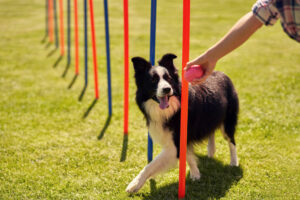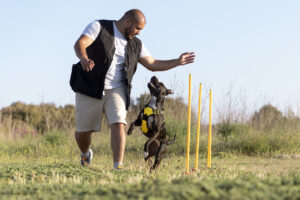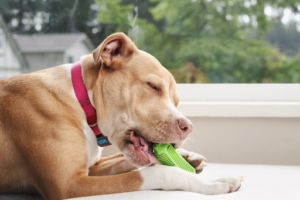Is cheese safe for dogs?
We already know that cheese is quite addictive. When it breaks down in a dog’s stomach (or even ours), it produces a peptide called casomorphin. Research showed that it could attach to brain receptors and produce dopamine,” the happy chemical,” which means that cheese has addictive properties by nature – the very reason why dogs love it.
However, not all cheeses are created equal. In this article, we’ll answer whether cheese is safe for dogs or not!
Why Do Dogs Like Cheese?
Cheese contains special proteins that make it smell and taste so delicious. These same proteins stimulate the release of dopamine in a dog’s brain, causing them to feel pleasure.
That said, these benefits may not always suit the nutrient needs of our dogs.
Is Cheese Safe For Dogs?
Generally, it’s safe for dogs to eat cheese as it is packed with nutrients, including protein, Vitamin A, essential fatty acids, B-complex vitamins, and calcium, an important mineral for dogs that helps maintain strong bones and teeth. It also contains nutrients that contribute to a dog’s overall health.
As long as it is only in moderation, and they won’t eat it very often, dogs can eat cheese. It can also be used as a handy training tool and help conceal medications whenever you have difficulty giving such to your pups.
However, the simple answer to the question above still depends on the individual dog.
Factors to Consider When Giving Cheese to Dogs
Here are some things to keep in mind before giving cheese to your dogs.
- Dogs are lactose intolerant. Their bodies cannot fully digest dairy products. Hence they might get an upset stomach. As such, choose low-fat cheese like cottage cheese or mozzarella. Avoid those with a high-fat content like goat cheese, feta, and brie.
- Cheese can cause weight gain. It has lots of calories due to its naturally high-fat content. As such, avoid feeding your pups cheese if they have weight concerns.
- Avoid cheese if your dog has issues with their pancreas. Pancreatitis is a condition caused by high fat levels in the diet. Cheese is high in fat, so it should be avoided.
- Lastly, avoid cheese for dogs with kidney issues. Cheese has a high phosphorus content, which is something to be avoided in dogs with kidney disease.
What Cheese Can Dogs Eat?
Luckily for dogs, there are many types of cheese that they can try out. At the same time, though, there are also some that should be avoided.
Good Cheese for Dogs
These cheese have low-fat levels and are generally safe for dogs.
- Cheddar cheese
- Mozzarella cheese
- Cottage cheese
- Soft goat cheese
- Cream cheese (in small amounts)
- Swiss cheese
Bad Cheese for Dogs
Bad cheese includes those that are high-fat, high-calorie, and downright toxic.
- Blue cheeses such as Roquefort, Gorgonzola, and Stilton. The fungus involved in making such cheese may affect dogs and develop symptoms like vomiting, diarrhea, high temperature, and seizures. It contains mold that can be toxic to dogs, even in small amounts.
- Seasoned Cheeses that contain fruits, herbs, and vegetables like chives, onions or garlic, nuts, and raisins.
- Spicy cheeses like pepper jack and spicy sriracha cheddar.
- Cheese high in saturated fat like goat cheese, brie, and feta.
Conclusion
So, is cheese safe for dogs? Yes, in moderation, and as long as you stick to the types of cheese listed above.
As a general rule, start with small amounts of cheese only if you are going to feed them. Avoid high-fat cheeses as they will often lead you to feed your dog more calories than they need, putting them at risk for developing obesity and other health problems later on.
For more tips on proper nutrition for your pup, be sure to visit the PetFitness blog!







